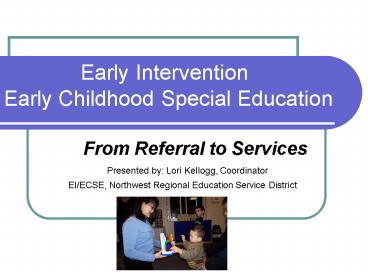Early Intervention Early Childhood Special Education - PowerPoint PPT Presentation
1 / 31
Title:
Early Intervention Early Childhood Special Education
Description:
Provides services to children birth through age 2 with developmental delays, ... 45 calendar days. ECSE Referral (3 to 5 years of age) Re-evaluation - EI to ECSE ... – PowerPoint PPT presentation
Number of Views:2517
Avg rating:3.0/5.0
Title: Early Intervention Early Childhood Special Education
1
Early InterventionEarly Childhood
Special Education
- From Referral to Services
- Presented by Lori Kellogg, Coordinator
- EI/ECSE, Northwest Regional Education Service
District
2
EI/ECSE Discussion Points
- Program description
- Program goals
- Referral
- Process Flowchart
- Eligibility criteria
- Professionals involved
- How services are provided
- Where services are provided
- Community collaboration
3
Program Description
- EI- Early Intervention
- Provides services to children birth through age 2
with developmental delays, or at risk - ECSE Early Childhood Special Education
- Provides services to children ages 3 to 5 with
developmental delays
4
Program Description
- Statutorily mandated by federal and state
- Provided at no cost for eligible students
5
Early Intervention Goals
- Provide parent training and coaching
- Assist in skill development
- Facilitate within routines and activities of
everyday life
6
Early Childhood Special Ed Goals
- Continuation of EI goals
- Promote educational skill development
- Least restrictive environment
7
Referrals
- Anyone can make a referral
- Call local county contact per the
Do You Have Concerns brochure.
8
Referral/Eligibility Flowchart
9
EI Referral Sources (birth through age 2)
- Parents, physicians, hospitals, clinics, Public
Health, New Parent Network, anyone with a concern
about a childs development
10
EI Referral Sources
- CAPTA Child Abuse Prevention and Treatment Act
- Requires developmental screening for every child,
birth to age 3 with substantiated case of abuse
or neglect - Federal requirement as of 2003
11
EI Referral Sources
- EHDI - Early Hearing Detection and Intervention
- Mandates newborn hearing screening for infants
born in hospitals with more than 200 births per
year - Enrollment in EI programs if hearing loss is
substantiated
12
EI Screening
- Process No medical diagnosis
- Screening typically at home visit
- If developing typically per screening no
evaluation - If delays suspected, an evaluation appointment is
scheduled
13
EI Evaluation
- Process Medical diagnosis for a condition with
established risk of developmental delay - Referral information indicates a significant
medical condition - Medical records are requested to substantiate
diagnosis - CBA curriculum based assessment completed
- It is not necessary to demonstrate delays
14
EI Evaluation
- Standardized assessment is utilized for
determining skill level in each of the following
domains - Cognitive
- Adaptive (self-help)
- Gross motor
- Fine motor
- Social
- Communication
15
EI Eligibility (birth to 2)
- Significant delay in one or more developmental
area - (1.5 standard deviations (SD) or more below the
mean in two or more developmental areas, or 2.0
SD below the mean in one area)
- OR
- Based on a physicians statement of physical or
mental condition likely to result in
developmental delays. Some of these conditions
may be extreme prematurity of birth, genetic
syndromes, significant vision, hearing,
or motor impairments.
16
EI Eligibility
- If evaluation demonstrates significant delays
- Meeting will be scheduled
- Eligibility
- IFSP developed based on childs needs and
familys priorities and concerns - If evaluation demonstrates typical development
- Non-eligibility completed
17
EI Eligibility Categories
- Hearing Impairment
- Vision Impairment
- Deaf Blindness
- Orthopedic Impairment
- Autism Spectrum Disorder
- Physical or Mental Condition Likely to Result in
Developmental Delay - Developmental Delay
18
EI Services
- Parent coaching model
- Based on individual childs needs and family
priorities - Provided in natural environments
- Home
- Daycare
- Places where typically
developing children may
be with parents/caregivers
19
EI Process Timeline
- EI referral to services
- 45 calendar days
20
ECSE Referral (3 to 5 years of age)
- Re-evaluation - EI to ECSE
- Parents, preschools, daycares, physicians, Head
Start, Public Health, others
21
ECSE Evaluation
- Conducted in areas of suspected delay
- Must provide adequate information to consider
eligibility and, if eligible, develop IFSP
22
ECSE Eligibility
- Significant delay in one or more developmental
areas - (1.5 standard deviations or more below the mean)
- Adverse impact on students educational
performance
23
ECSE Eligibility Categories
- Communication Disorder
- Emotional Disturbance
- Hearing Impairment
- Deaf Blindness
- Vision Impairment
- Orthopedic Impairment
- Autism Spectrum Disorder
- Other Health Impairment
- Traumatic Brain Injured
- Mental Retardation
- Specific Learning Disability
- Developmental Delay
24
ECSE Service
- Provided in least restrictive environment
- Based on childs individual needs
- Determined by the IFSP team
25
EI/ECSE Children in Oregon
26
EI/ECSE Distribution of Disabilities in Oregon
27
Professionals Involved
- Early Childhood Education Specialists (teacher)
- Speech/Language Pathologists
- Occupational Therapists
- Physical Therapists
- School Psychologists
- Autism Specialists
- Deaf/Hard of Hearing Specialist
- Vision Specialist
- Nurses
- Interpreters
28
How Services are Provided
- Home visits
- Parent trainings
- Parent/Toddler classes
- Community consultation
- Speech/Language classes
- 11 instruction
- Self-contained preschools
- Integrated Preschool
29
Community Collaboration
- Head Start
- New Parent Network
- Public Health
- Developmental Disabilities
- Mental Health
- Community preschools
- DHS-Child Welfare
- Local Universities
30
Referral Process Review
- Anyone can make a referral
- Call local county contact per the
Do You Have Concerns brochure. - Observation and developmental screening
- If delays are suspected, evaluation is completed
- EI In all developmental areas
- ECSE In areas of suspected delay
- Eligibility
- Individual Family Service Plan (IFSP)
- IFSP defines goals and services
31
Questions?































